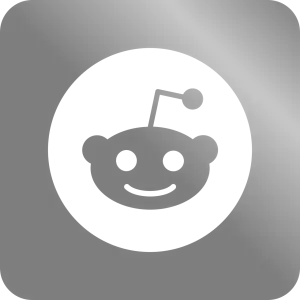Nasty Zits Popped: Should You Look Away or Learn?

Why We Pop
We all know we shouldn't, yet the allure of a ripe zit is sometimes too strong to resist. So, what is it about these little blemishes that make us want to squeeze?
There's a strange satisfaction that comes with popping a zit. The pressure, the release, and the sight of all that gunk coming out can be oddly satisfying. This satisfaction might be linked to our evolutionary history. Our ancestors may have picked at wounds and blemishes to remove foreign objects or parasites, promoting healing. This natural instinct to groom and clean might explain our modern-day fascination with pimple popping.
Beyond the primal urge, there's a psychological component at play. Popping zits can be a way of exerting control, especially during times of stress. When we feel overwhelmed, taking charge of something tangible, even if it's just a pimple, can provide a sense of relief and agency.
Let's be clear, though: dermatologists strongly advise against popping your own zits. While that satisfying squeeze might seem harmless, it can have some nasty consequences. Squeezing can push bacteria and pus deeper into the skin, leading to more inflammation, infection, and even scarring.
Instead of giving in to the temptation, consider these alternatives: apply a warm compress to help the pimple drain naturally, use over-the-counter spot treatments containing benzoyl peroxide or salicylic acid, and most importantly, be patient.
If you're struggling with acne, consult a dermatologist. They can provide personalized advice and treatment options to help you achieve clear, healthy skin without resorting to popping.
The Science of Zits
We all know the oddly satisfying feeling, but what’s actually going on under the skin when we get a zit? And is squeezing them ever a good idea? Let’s dive into the science of zits.
Picture a pore in your skin. Inside, you’ve got sebaceous glands working hard producing sebum, an oily substance that keeps your skin moisturized. Sometimes, dead skin cells, dirt, or excess sebum can clog up this pore. This blockage is the perfect breeding ground for bacteria, particularly a strain called Cutibacterium acnes (formerly Propionibacterium acnes). As the bacteria multiply, they cause inflammation and swelling, leading to the formation of different types of acne lesions: whiteheads, blackheads, papules, pustules, nodules, or cysts.
Now, about that popping. While it might be tempting to unleash your inner Dr. Pimple Popper, dermatologists strongly advise against it. Here’s why:
Scarring: When you squeeze a zit, you’re essentially creating an open wound. This trauma to the skin increases the risk of permanent scarring.
Infection: Your fingers aren't sterile. Touching your face, especially an open zit, can introduce more bacteria into the area, potentially leading to a more severe infection.
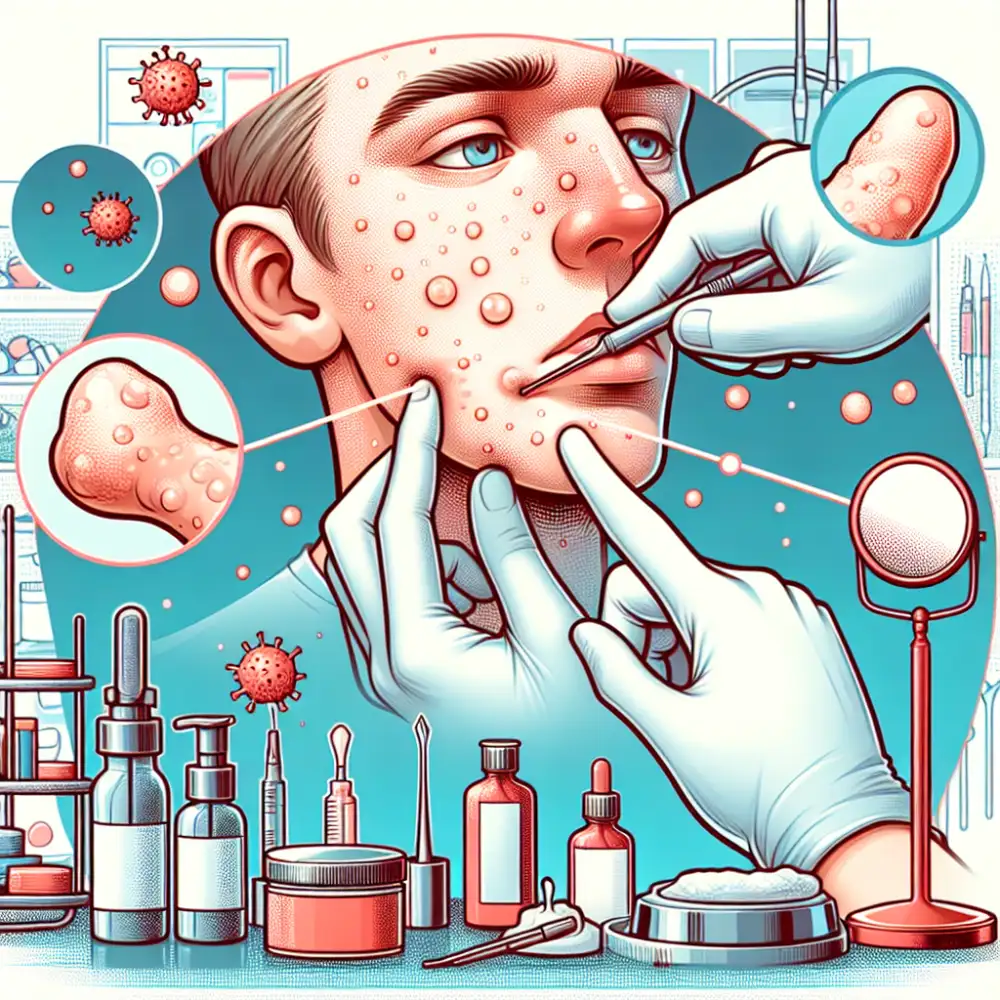
Spreading: Squeezing can push the pus and bacteria deeper into the skin, spreading the infection and causing more breakouts.
Instead of taking matters into your own hands, consider these dermatologist-approved tips:
Gentle Cleansing: Wash your face twice a day with a mild cleanser. Avoid harsh scrubs, which can irritate the skin.
Over-the-Counter Treatments: Look for products containing benzoyl peroxide, salicylic acid, or retinoids. These ingredients can help unclog pores and reduce inflammation.
Prescription Medications: For more severe acne, a dermatologist may prescribe oral or topical medications.
Hands Off: Resist the urge to touch or pick at your skin.
Remember, patience is key. With the right approach, you can manage breakouts and keep your skin healthy. If you have concerns about your skin, consult a dermatologist for personalized advice and treatment options.
Risks of Popping
While it's incredibly tempting to pop that juicy zit, dermatologists strongly advise against it. Here's why:
Scarring: Squeezing a pimple can force bacteria and pus deeper into the skin, increasing inflammation and the risk of scarring.
Infection: Your fingers are a breeding ground for bacteria. Touching your face, especially an open pimple, introduces bacteria that can lead to a more serious infection.
Delayed Healing: Popping disrupts the natural healing process of your skin, potentially prolonging the life of the blemish and increasing the likelihood of post-inflammatory hyperpigmentation (dark spots).
Worsening Acne: Manipulating your skin can spread bacteria and irritate surrounding areas, potentially triggering more breakouts.
Dermatologist Intervention: Severe cases of picking and popping can lead to skin infections requiring medical attention, including antibiotics or other treatments.
The Allure of Pimple-Popping Videos:
The internet is flooded with videos of pimple-popping, often presented in a satisfying and almost clinical way. However, it's crucial to remember that these videos rarely show the potential negative consequences. Watching these videos might normalize or even encourage skin picking, a behavior that can become compulsive and lead to skin damage and emotional distress.
The Bottom Line:
Resist the urge to pop! Opt for gentle skincare, spot treatments, and consult a dermatologist for stubborn or severe acne. Your skin will thank you in the long run.
Safe Extraction Tips
It's incredibly tempting, we know, but resist the urge to squeeze that zit! Picking or popping, especially if done incorrectly, can push bacteria deeper into the skin, leading to more inflammation, a longer healing process, and even scarring. If you're dealing with a particularly large or painful pimple, consider these safer alternatives:
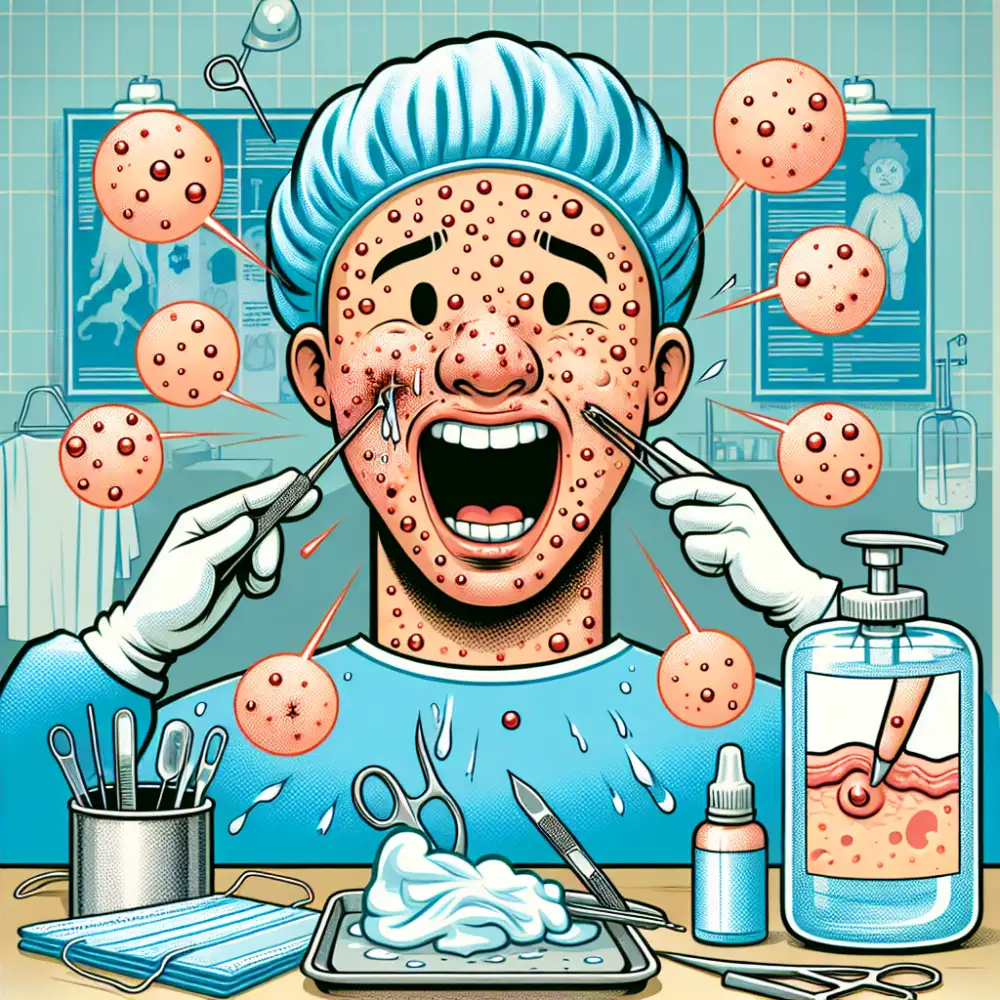
Warm compress: Apply a warm compress to the affected area for 10-15 minutes several times a day. This can help soften the skin and draw the pus closer to the surface, potentially allowing it to drain naturally.
Over-the-counter treatments: Look for spot treatments containing benzoyl peroxide or salicylic acid. These ingredients can help kill bacteria and reduce inflammation.
Hydrocolloid bandages: These bandages create a moist environment that can help draw out impurities and promote healing. They're also great for protecting the area from further irritation.
See a dermatologist: For stubborn or severe acne, a dermatologist can provide professional extraction or recommend other treatment options like topical or oral medications.
Remember, patience is key when it comes to acne. By avoiding picking and choosing safer alternatives, you can help your skin heal properly and minimize the risk of complications.
Dermatologist Recommended Products
We know, we know. You just saw that video of a massive zit being popped, and now your fingers are itching to tackle your own blemishes. But before you grab that magnifying mirror and go to town, remember your dermatologist's advice: resist the urge to pop!
Picking at pimples can push bacteria and pus deeper into the skin, increasing inflammation and the risk of scarring. Plus, it's just not sanitary.
However, we understand that sometimes a pimple needs a little professional help. If you're dealing with a particularly stubborn or painful blemish, your dermatologist can safely and effectively address it. They have the tools and expertise to minimize inflammation and reduce the risk of scarring.
In the meantime, here are some dermatologist-recommended products to help keep your skin clear and calm:
Gentle Cleanser: Look for a cleanser formulated for acne-prone skin that contains ingredients like salicylic acid or benzoyl peroxide. These ingredients help to unclog pores and reduce bacteria.
Spot Treatment: A spot treatment containing salicylic acid, benzoyl peroxide, or tea tree oil can help to dry out individual pimples.
Non-Comedogenic Moisturizer: Even oily skin needs moisture! Choose a moisturizer that is oil-free and non-comedogenic, meaning it won't clog your pores.
Sunscreen: Sun exposure can worsen acne and hyperpigmentation (dark spots). Apply a broad-spectrum sunscreen with an SPF of 30 or higher every day, even on cloudy days.
Remember, consistency is key when it comes to skincare. Be patient and stick to your dermatologist-recommended routine for the best results. And please, resist the urge to pop!
When to See a Pro
While it can be super tempting to channel your inner Dr. Pimple Popper, there are times when you absolutely should not attempt to pop a zit yourself. Here's when it's time to step away from the magnifying mirror and call in a professional:
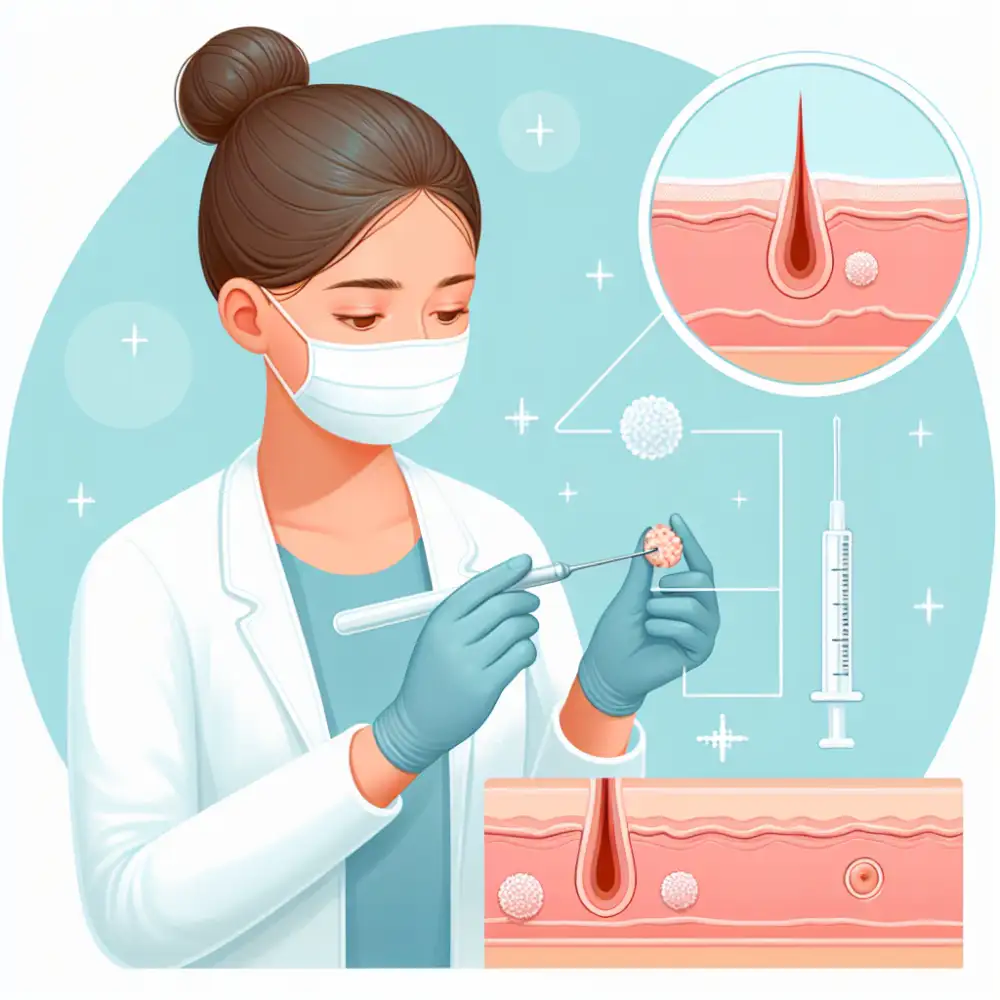

Deep, painful cysts: Those big, red, throbbing bumps that hurt to even touch? Yeah, those are best left to the pros. These are often cystic acne, which are deep-seated and can easily become infected if tampered with. A dermatologist can safely drain them and provide you with the right treatment.
Zits near sensitive areas: We're talking about the triangle of death – the area around your nose and mouth. Veins in this area drain to the brain, and squeezing zits here can increase the risk of a serious infection spreading.
No improvement with home care: If you've been diligently following a good skincare routine and those pesky pimples aren't budging (or worse, they're multiplying), it's time to see a dermatologist. They can help determine the underlying cause and recommend the most effective treatment plan.
Signs of infection: If a zit becomes increasingly red, swollen, painful, or starts oozing pus, it's a sign of infection. Don't try to treat this yourself – seek medical attention promptly.
Concerns about scarring: If you're prone to scarring or are worried about a zit leaving a mark, it's best to avoid picking or squeezing. A dermatologist can provide treatments to minimize scarring.
Remember, watching pimple-popping videos can be oddly satisfying, but it's crucial to prioritize your skin's health. When in doubt, always err on the side of caution and consult with a board-certified dermatologist.
Long-Term Acne Solutions
While that gruesome video of a particularly stubborn blackhead biting the dust might be oddly satisfying, it's crucial to remember that popping zits at home is a big no-no in the dermatology world. Dermatologists cringe for a reason. Squeezing, picking, or popping can shove bacteria and pus deeper into your skin, increasing inflammation and potentially leading to scarring. Plus, those bacteria-laden fingers near your face? A recipe for more breakouts.
So, you've tossed the magnifying mirror and sworn off DIY extractions (good for you!). What are the real, long-term solutions for acne? The answer lies in a multi-pronged approach tailored to your unique skin.
Consult a Dermatologist: This is non-negotiable. A dermatologist can identify the type of acne you have, its severity, and underlying causes. They can then recommend the most effective treatment plan, which might include:
Topical Treatments: Retinoids, benzoyl peroxide, and salicylic acid are common ingredients that work by unclogging pores, reducing inflammation, and killing bacteria.
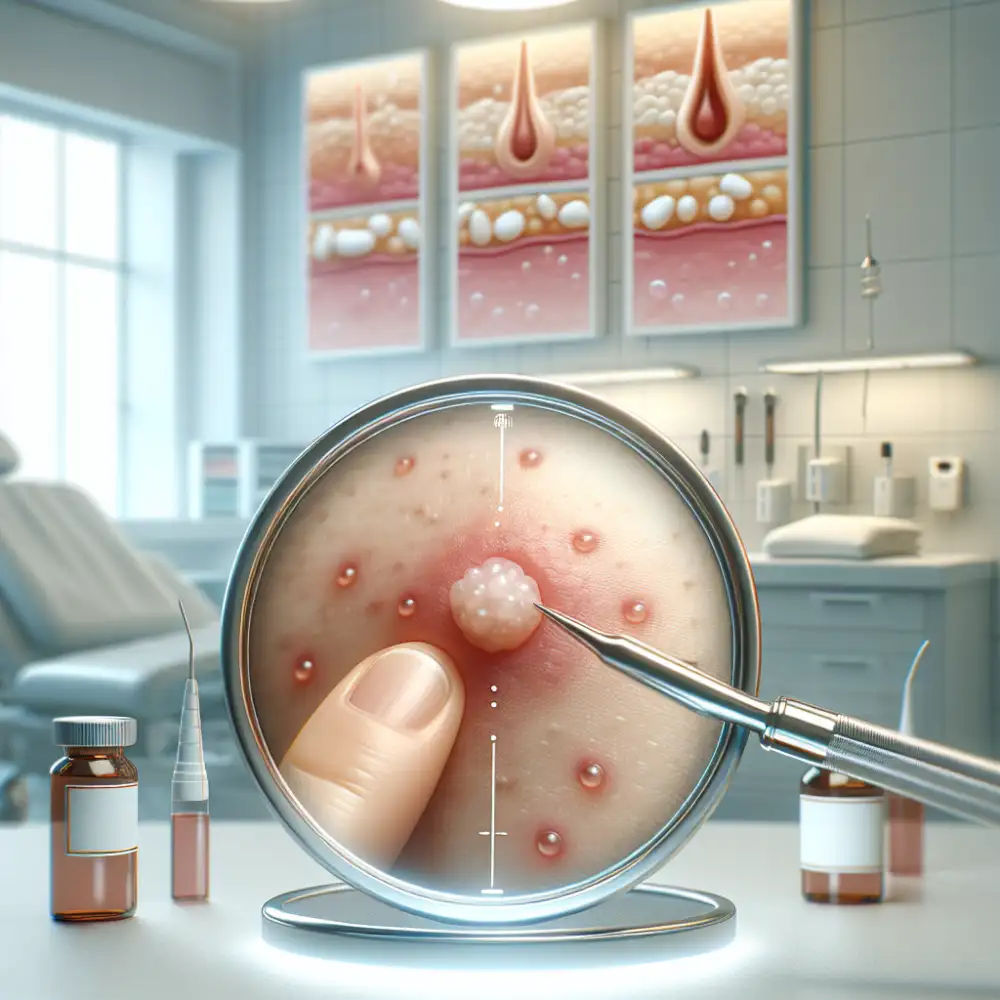
Oral Medications: For more severe or stubborn acne, oral antibiotics, hormonal therapies, or even isotretinoin (commonly known as Accutane) might be necessary.
Other Procedures: Chemical peels, light therapy, and laser treatments can target acne and improve skin texture.
Lifestyle Modifications: Your skin reflects your overall health.
Diet: While the link between diet and acne is complex, some studies suggest that high-glycemic foods and dairy might exacerbate breakouts. Focus on a balanced diet rich in fruits, vegetables, and whole grains.
Stress Management: Stress hormones can trigger acne flare-ups. Explore stress-reducing techniques like exercise, yoga, or meditation.
Sleep Hygiene: Aim for 7-9 hours of quality sleep each night. Sleep deprivation can disrupt hormone balance and worsen acne.
Skincare Routine: Consistency is key.
Cleanse Gently: Wash your face twice daily with a mild, non-comedogenic (won't clog pores) cleanser. Avoid harsh scrubs, which can irritate the skin.
Moisturize: Even oily skin needs hydration. Choose an oil-free, non-comedogenic moisturizer.
Sun Protection: Sun exposure can worsen acne scars. Apply a broad-spectrum sunscreen with an SPF of 30 or higher daily.
Remember, achieving clear skin is a marathon, not a sprint. Be patient, consistent with your treatment plan, and don't hesitate to reach out to your dermatologist if you have any concerns.
Published: 24. 06. 2024
Category: Health



